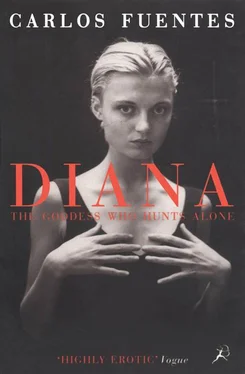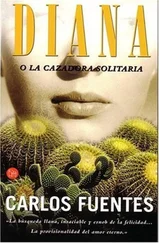Carlos Fuentes - Diana the Goddess Who Hunts Alone
Здесь есть возможность читать онлайн «Carlos Fuentes - Diana the Goddess Who Hunts Alone» весь текст электронной книги совершенно бесплатно (целиком полную версию без сокращений). В некоторых случаях можно слушать аудио, скачать через торрент в формате fb2 и присутствует краткое содержание. Год выпуска: 2012, Издательство: Bloomsbury UK, Жанр: Современная проза, на английском языке. Описание произведения, (предисловие) а так же отзывы посетителей доступны на портале библиотеки ЛибКат.
- Название:Diana the Goddess Who Hunts Alone
- Автор:
- Издательство:Bloomsbury UK
- Жанр:
- Год:2012
- ISBN:нет данных
- Рейтинг книги:3 / 5. Голосов: 1
-
Избранное:Добавить в избранное
- Отзывы:
-
Ваша оценка:
- 60
- 1
- 2
- 3
- 4
- 5
Diana the Goddess Who Hunts Alone: краткое содержание, описание и аннотация
Предлагаем к чтению аннотацию, описание, краткое содержание или предисловие (зависит от того, что написал сам автор книги «Diana the Goddess Who Hunts Alone»). Если вы не нашли необходимую информацию о книге — напишите в комментариях, мы постараемся отыскать её.
Diana the Goddess Who Hunts Alone — читать онлайн бесплатно полную книгу (весь текст) целиком
Ниже представлен текст книги, разбитый по страницам. Система сохранения места последней прочитанной страницы, позволяет с удобством читать онлайн бесплатно книгу «Diana the Goddess Who Hunts Alone», без необходимости каждый раз заново искать на чём Вы остановились. Поставьте закладку, и сможете в любой момент перейти на страницу, на которой закончили чтение.
Интервал:
Закладка:
“I mean that we are an army that emanated from the revolution, a people’s army …”
“That nevertheless fires on the people if necessary.”
“If it’s ordered by the constituted authority, civilians,” he said without so much as a blink, but I sensed that I’d wounded him, that I’d touched an open sore, that the memory of Tlatelolco was shameful to the army, which wanted to forget the episode and did not speak about it. But at the same time I was to understand what Cedillo was telling me: We only obeyed orders, our honor is intact.
“You shouldn’t have done the work of the police or the hawks,” I said, and immediately regretted it, not on my account but for my American friends, for Diana. I was breaking my own rule, the one I’d explained to the student Carlos Ortiz: I have no right to compromise them politically.
I was sorry for another reason. By comparing the army to cops and hired assassins, I had insulted it unnecessarily, I thought to myself, just because I was playing around, just because I, too, was a provocateur. But as always happens with me, the more I swore I wouldn’t get involved in politics, the more politics got involved with me.
“You were very critical of what happened in ’68, I know,” he said, wiping the pork-rump sauce off his lips.
“I didn’t say even half of what I wanted to,” I answered, now out of control, all but foaming at the mouth.
“Tell your girlfriend to be careful,” said the Mexican samurai, suddenly transformed into a genuine warlord, owner of the lives gathered that evening around his will, his whim, his mystery.
I couldn’t believe my ears. Tell your girlfriend to be careful? Is that what the general said? As if to remove any doubts, Cedillo then did what I feared he’d do: he looked at Diana. He stared directly at her, with no disguise, no reticence, a savage glint in his eyes, where I discerned, along with terror, lust, and death, an instinct tamed for centuries the more easily to leap on its prey, a prey already overwhelmed in that “right moment” the general had mentioned when we talked about 1968. He wanted her, he was threatening her, he hated me — he hated both of us, Diana and me. The commander’s eyes communicated to us in that moment an intense social hatred, an implacable class opposition, a resentment I felt in waves, and the intensity of that soldier’s stare (usually veiled) communicated it to the others at the table — the mayor, the governor, the local bigwigs, the bodyguards. Those brutes watched Cedillo like people receiving the Host at Communion who feel their bodies and souls full of the Lord. They stirred, moved around, regrouped, advanced slightly, raised their hands to the secret guns in their armpits — until the general’s eyelids lowered and the order to stand at ease was conveyed to them by those eyes so accustomed to giving orders and being obeyed without hesitation, from afar, blindly, if it came to that.
It was like being caught in a sudden undertow; the tide went out, the instant of tension went no further, the bodyguards went back to smoking and standing around in Masonic circles, the governor, the idiot, played the fool, the mayor ordered the coffee served. But within me the alarm the general aroused continued. His threat hadn’t dissipated; I knew it would be with me, much to my regret, for the rest of my time in Santiago, screwing up my love, my work, my tranquillity …
“Don’t get involved in anything in Mexico,” I told Diana after I had used her as an excuse to say good-bye. She had a 5:00 a.m. call, so we rose and slowly left the patio. “You get involved, and you’ll never get out of it.”
She gave me a determined look, as if I’d insulted her by recommending caution.
I was pleased to see the group of students in a corner of the patio and to realize I could easily tell them apart from the bodyguards. There was no way to confuse the two. Carlos Ortiz was very different from the general and his bodyguards. Knowing the students were different and new saved the evening for me — perhaps they themselves were saved … Even so, my anxiety about Diana because of what the general said prevailed over any desire for satisfaction. What did he mean? How could a Hollywood actress bother, interfere with, provoke a general in the Mexican Army?
“Did you sense how heavy the atmosphere was?” I said to Diana.
“Yes. But I didn’t understand the reason for it. Did you?”
“No. Me neither.”
“We made them jealous because we love each other.” Then the woman laughed a beautiful laugh.
“That’s it. Yes. No doubt about it.”
The words of General Agustín Cedillo reverberated in my head. “Tell your girlfriend to be careful. Whenever you like, come by at two and have lunch with me at the club. Right here in Central Square.”
XX
To respond properly to the gift of the Italian toothpaste and to excuse myself for my attitude toward the shepherd boy, I went out one boring, blazing afternoon to find a present for Diana. The streets of Santiago were abysmally solitary during the afternoon; a leaden sun slammed against the benches, and there were few trees or awnings to provide shade. I felt tired and dizzy after walking ten blocks. I leaned against an ocote-pine-paneled door, and as I did so I caught a glimpse of a cave filled with treasure. It was an antique shop that, for provincial reasons I could not discern, had no sign.
There are restaurants like that in Oaxaca, bookstores in Guadalajara, bars in Guanajuato that don’t tell what they are. They believe, I imagine, that advertising isn’t needed to lure their clientele. These secret places in Mexico feel that the crowds brought in by publicity would only cheapen the quality of what they offer, and then they would have to satisfy the taste of the least common denominator. The truth is that there is a secret country within Mexico that does not advertise itself, that only tradition knows and recognizes. There, cuisines, legends, memories, conversations — everything that disappears, evaporated, the moment neon light blares it — gestate and continue.
There was lots of turn-of-the-century furniture. Families, when they modernized, when they emigrated from the province to the capital, abandoned these fin de siècle marvels: wicker armchairs, pier glasses, marble-topped dressers, wash-stands, genre paintings — hunting scenes, still lifes … The owner of the shop came over to me. He was a mestizo with slanty eyes, wearing a striped shirt with no collar or tie, although his vest was crossed by a valuable gold watch chain. I smiled and asked if business was going well. “I keep things,” he said. “I keep things from turning into dust.”
“May I look around?”
“Make yourself at home.”
I found an easel piled with posters and badly neglected engravings. I have no idea how posters for the Normandie, with its marvelous Art Deco lines, ended up there, even if I could imagine how the ones for the M-G-M films I had seen as a boy in the Iris theater in Mexico City— Mutiny on the Bounty, The Good Earth, Marie Antoinette —might have …
My fingers touched a sturdy wrinkled paper that had suffered much less than the posters. I smelled or sensed something in that touch and very carefully extracted it from the nest of forgotten colors. It was a Posada. An etching by José Guadalupe Posada, lost in that shop, well preserved, with the printer’s address: Antonio Vanegas Arroyo, No. 1 Santa Teresa Street, 1906. I extracted it as if I were in the Albertina in Vienna touching a Lucas Cranach etching. I’m not mistaken in my comparison. There is a relation, distant but certain, between the German painter of the sixteenth century and this artist of the Mexican provinces who died in 1913. They’re linked by a long dance of death, a galliard that goes its implacable way, weaving bodies together, day after day adding treasures to humanity’s most abundant wealth, death.
Читать дальшеИнтервал:
Закладка:
Похожие книги на «Diana the Goddess Who Hunts Alone»
Представляем Вашему вниманию похожие книги на «Diana the Goddess Who Hunts Alone» списком для выбора. Мы отобрали схожую по названию и смыслу литературу в надежде предоставить читателям больше вариантов отыскать новые, интересные, ещё непрочитанные произведения.
Обсуждение, отзывы о книге «Diana the Goddess Who Hunts Alone» и просто собственные мнения читателей. Оставьте ваши комментарии, напишите, что Вы думаете о произведении, его смысле или главных героях. Укажите что конкретно понравилось, а что нет, и почему Вы так считаете.












